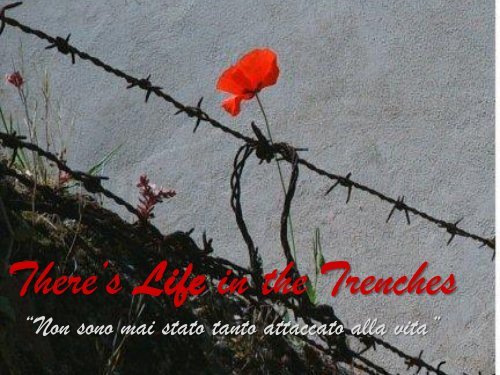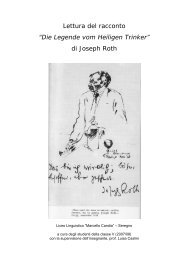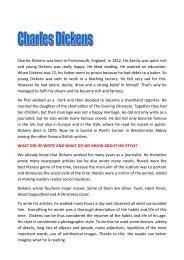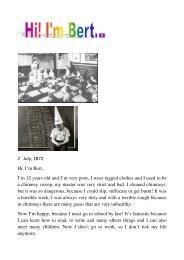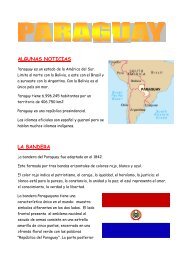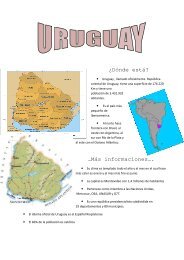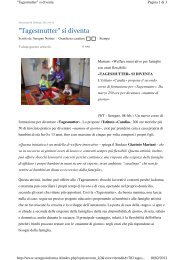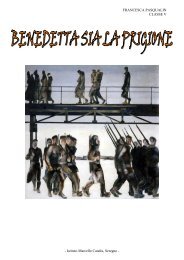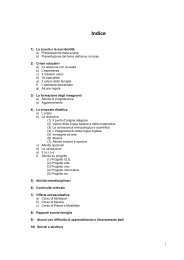There's Life in the Trenches
There's Life in the Trenches
There's Life in the Trenches
Create successful ePaper yourself
Turn your PDF publications into a flip-book with our unique Google optimized e-Paper software.
There’s <strong>Life</strong> <strong>in</strong> <strong>the</strong> <strong>Trenches</strong><br />
“Non sono mai stato tanto attaccato alla vita”
The English Propaganda<br />
The government <strong>in</strong><br />
London acted<br />
quickly <strong>in</strong> br<strong>in</strong>g<strong>in</strong>g<br />
out a stream of<br />
recruitment<br />
posters, <strong>in</strong>clud<strong>in</strong>g<br />
possibly <strong>the</strong> most<br />
famous of its type,<br />
featur<strong>in</strong>g Lord<br />
Kitchener ("Your<br />
Country Wants<br />
You!").
The propaganda was not addressed only to<br />
soldiers but also to women at home. They<br />
were asked to save for food and build<br />
weapons for <strong>the</strong> soldiers at <strong>the</strong> front to<br />
support <strong>the</strong>m.
The Propaganda was aimed to set British aga<strong>in</strong>st<br />
Germans, disparag<strong>in</strong>gly called “Huns”.
The First Enthusiasm<br />
The propaganda and <strong>the</strong><br />
reason given by <strong>the</strong><br />
government caused<br />
enthusiasm for <strong>the</strong> war and<br />
a feel<strong>in</strong>g of patriotism.<br />
Some soldiers wrote <strong>the</strong><br />
“war sonnets” celebrat<strong>in</strong>g<br />
England. One of <strong>the</strong>m was<br />
Rupert Brooke who wrote<br />
“The Soldier”. It was written<br />
<strong>in</strong> <strong>the</strong> first months of World<br />
War I, when patriotism and old<br />
heroic ideals had not yet died.<br />
The Soldier<br />
If I should die, th<strong>in</strong>k only this of me:<br />
That <strong>the</strong>re’s some corner of a foreign field<br />
That isf orever England. There shall be<br />
In that rich earth a richer dust concealed;<br />
A dust whom England bore, shaped, made aware,<br />
Gave, once, her flowers to love, her ways to roam,<br />
A body of England’s, breath<strong>in</strong>g English air,<br />
Washed by <strong>the</strong> rivers, blest by suns of home.<br />
And th<strong>in</strong>k, this heart, all evil shed away<br />
A pulse <strong>in</strong> <strong>the</strong> eternal m<strong>in</strong>d, no less<br />
Gives somewhere back <strong>the</strong> thoughts by England given;<br />
Her sights and sounds; dreams happy as her day;<br />
And laughter, learnt of friends; and gentleness,<br />
In hearts at peace, under an English heaven.
L’orgoglio italiano<br />
Anche <strong>in</strong> Italia si era diffusa una concezione<br />
romantica della guerra. Si pensava che<br />
l’<strong>in</strong>tervento italiano fosse necessario e nobile e la<br />
guerra si sarebbe conclusa brevemente. In<br />
seguito si rivelò essere estremamente devastante.<br />
Lo scrittore Giovanni Pap<strong>in</strong>i nel 1914 scrisse:<br />
“Ci voleva, alla f<strong>in</strong>e, un caldo bagno di sangue nero dopo tanti<br />
umidicci e tiepidumi di latte materno e di lacrime fraterne. Ci<br />
voleva una bella <strong>in</strong>naffiatura di sangue per l’arsura dell’ agosto; e<br />
una rossa sv<strong>in</strong>atura per le vendemmie di settembre; e una<br />
muraglia di svampate per i freschi di settembre.”<br />
(da “Amiamo la guerra”- Giovanni Pap<strong>in</strong>i)
The Combat:<br />
WAR POETRY<br />
“There’s life <strong>in</strong> <strong>the</strong> trenches”<br />
The attitude began chang<strong>in</strong>g because soldiers got disappo<strong>in</strong>ted and<br />
began realis<strong>in</strong>g that:<br />
• The ideals <strong>the</strong>y enrolled for were not so true<br />
• <strong>the</strong> war was not that short<br />
• Germans were not so devilish<br />
satire & sarcasm<br />
The Government went on say<strong>in</strong>g “old lies” to those at home through<br />
censorship.<br />
British people did not want to enrol any longer and conscription<br />
started.
Dulce et Decorum Est<br />
WILFRED OWEN<br />
[…]<br />
Gas! Gas! Quick, boys! – An ecstasy of fumbl<strong>in</strong>g,<br />
Fitt<strong>in</strong>g <strong>the</strong> clumsy helmets just <strong>in</strong> time;<br />
But someone still was yell<strong>in</strong>g out and stumbl<strong>in</strong>g,<br />
And flound'r<strong>in</strong>g like a man <strong>in</strong> fire or lime . . .<br />
Dim, through <strong>the</strong> misty panes and thick green<br />
light,<br />
As under a green sea, I saw him drown<strong>in</strong>g.<br />
[…]<br />
If <strong>in</strong> some smo<strong>the</strong>r<strong>in</strong>g dreams you too could<br />
pace<br />
Beh<strong>in</strong>d <strong>the</strong> wagon that we flung him <strong>in</strong>,<br />
And watch <strong>the</strong> white eyes writh<strong>in</strong>g <strong>in</strong> his face,<br />
His hang<strong>in</strong>g face, like a devil's sick of s<strong>in</strong>;<br />
If you could hear, at every jolt, <strong>the</strong> blood<br />
Come gargl<strong>in</strong>g from <strong>the</strong> froth-corrupted lungs,<br />
Obscene as cancer, bitter as <strong>the</strong> cud<br />
Of vile, <strong>in</strong>curable sores on <strong>in</strong>nocent tongues,<br />
My friend, you would not tell with such high zest<br />
To children ardent for some desperate glory,<br />
The old Lie; Dulce et Decorum est<br />
Pro patria mori.<br />
Gas new terrible chemical weapon<br />
of World War I<br />
This scene is relived as a nightmare,<br />
with men drown<strong>in</strong>g <strong>in</strong> a green sea of<br />
gas.<br />
In <strong>the</strong> last stanza <strong>the</strong> soldier-poet<br />
follows <strong>the</strong> wagon carry<strong>in</strong>g dead or<br />
dy<strong>in</strong>g bodies.<br />
The old Lie: “It is sweet and glorious<br />
to die for one’s country”.<br />
Many similes help people, who<br />
haven’t experienced <strong>the</strong> war to<br />
imag<strong>in</strong>e its horrors.
Break of Day <strong>in</strong> <strong>the</strong><br />
<strong>Trenches</strong><br />
The darkness crumbles away<br />
It is <strong>the</strong> same old druid Time as ever,<br />
Only a live th<strong>in</strong>g leaps my hand,<br />
A queer sardonic rat,<br />
As I pull <strong>the</strong> parapet's poppy<br />
To stick beh<strong>in</strong>d my ear.<br />
Droll rat, <strong>the</strong>y would shoot you if <strong>the</strong>y knew<br />
Your cosmopolitan sympathies,<br />
Now you have touched this English hand<br />
You will do <strong>the</strong> same to a German<br />
Soon, no doubt, if it be your pleasure<br />
To cross <strong>the</strong> sleep<strong>in</strong>g green between.<br />
It seems you <strong>in</strong>wardly gr<strong>in</strong> as you pass<br />
Strong eyes, f<strong>in</strong>e limbs, haughty athletes,<br />
Less chanced than you for life,<br />
Bonds to <strong>the</strong> whims of murder,<br />
Sprawled <strong>in</strong> <strong>the</strong> bowels of <strong>the</strong> earth,<br />
The torn fields of France.<br />
What do you see <strong>in</strong> our eyes<br />
At <strong>the</strong> shriek<strong>in</strong>g iron and flame<br />
Hurled through still heavens?<br />
What quaver -what heart aghast?<br />
Poppies whose roots are <strong>in</strong> men's ve<strong>in</strong>s<br />
Drop, and are ever dropp<strong>in</strong>g;<br />
But m<strong>in</strong>e <strong>in</strong> my ear is safe,<br />
Just a little white with <strong>the</strong> dust.<br />
ISAAC ROSENBERG<br />
Rat irony men are stuck <strong>in</strong> <strong>the</strong><br />
trenches while this rat is<br />
free<br />
Poppy metaphor for soldiers’ lives<br />
If it is safe, <strong>the</strong> soldier is safe too<br />
Sleep<strong>in</strong>g green no man’s land: nei<strong>the</strong>r<br />
British nor German<br />
<strong>Trenches</strong> bowels of earth<br />
They are not fight<strong>in</strong>g .<br />
Soldiers are sleep<strong>in</strong>g :<br />
dead corpses
Veglia<br />
Un'<strong>in</strong>tera nottata<br />
buttato vic<strong>in</strong>o<br />
a un compagno<br />
massacrato<br />
con la sua bocca<br />
digrignata<br />
volta al plenilunio<br />
con la congestione<br />
delle sue mani<br />
penetrata<br />
nel mio silenzio<br />
ho scritto<br />
lettere piene d'amore<br />
Non sono mai stato<br />
tanto<br />
attaccato alla vita<br />
1915<br />
GIUSEPPE UNGARETTI<br />
Cima Quattro il 23 dicembre<br />
Ungaretti evidenzia le parole più<br />
significative isolandole <strong>in</strong> un verso .<br />
Esperienza reale attaccamento alla vita e<br />
paura di perderla.<br />
Tanto con questa parola Ungaretti<br />
esprime ancora di più l’amor per la vita<br />
rispetto a coloro che non vivono la guerra.<br />
Non sono mai stato<br />
tanto GNOME<br />
attaccato alla vita<br />
Dal film “La Grande Guerra”<br />
di Mario Maroncelli
Fratelli<br />
Di che reggimento siete<br />
fratelli?<br />
Parola tremante<br />
nella notte<br />
Foglia appena nata<br />
Nell'aria spasimante<br />
<strong>in</strong>volontaria rivolta<br />
dell'uomo presente alla sua<br />
fragilità<br />
Mariano il 15 luglio 1916<br />
L’uomo vuole v<strong>in</strong>cere il clima di negatività<br />
della guerra pronunciando la parola “fratelli”.<br />
Fratellanza trovarsi nella stessa<br />
condizione umana porta a sentirsi fratelli<br />
anche <strong>in</strong> guerra.<br />
Tremante perché si fa fatica a<br />
pronunciare.
War poetry<br />
BRITAIN VS ITALY<br />
No translations <strong>in</strong>to<br />
Italian<br />
Writ<strong>in</strong>g dur<strong>in</strong>g <strong>the</strong><br />
war. After?<br />
Some went on writ<strong>in</strong>g<br />
(Sassoon)<br />
Some wrote only <strong>in</strong> <strong>the</strong><br />
trenches. Why?<br />
Ungaretti<br />
Some translations <strong>in</strong>to<br />
English.
Bro<strong>the</strong>rs<br />
What regiment do you belong to,<br />
bro<strong>the</strong>rs?<br />
Word trembl<strong>in</strong>g <strong>in</strong> <strong>the</strong> night<br />
Leaf barely born<br />
In <strong>the</strong> shimmer<strong>in</strong>g air<br />
<strong>in</strong>voluntary rebellion<br />
of man present <strong>in</strong> his fragility<br />
Bro<strong>the</strong>rs.<br />
TRANSLATION<br />
Students’ translation<br />
Vigil<br />
A whole night long<br />
crouched close<br />
to one of our men<br />
butchered<br />
with his clenched<br />
mouth<br />
gr<strong>in</strong>n<strong>in</strong>g at <strong>the</strong> full moon<br />
with <strong>the</strong> congestion<br />
of his hands<br />
thrust right<br />
<strong>in</strong>to my silence<br />
I’ve written<br />
letters filled with love<br />
I have never been<br />
so<br />
coupled to life.<br />
Translated by Ungaretti himself
Home Front<br />
The role of women <strong>in</strong> <strong>the</strong> war<br />
“Valiant and Determ<strong>in</strong>ed’ I arise<br />
[every] day”
Introduction<br />
• “home front” <strong>the</strong> civilian population of a country at war.<br />
• Romantic image of <strong>the</strong> war<br />
• Censorship no news<br />
• Sassoon’s poetry women’s lack of knowledge of what <strong>the</strong> war<br />
really was.<br />
• Women’s <strong>in</strong>volvement not passive<br />
- <strong>in</strong> hospitals as nurses<br />
- <strong>in</strong> factories to build weapons<br />
The follow<strong>in</strong>g are two examples of how women were portrayed dur<strong>in</strong>g<br />
<strong>the</strong> war: one depicts <strong>the</strong>m as useless people, <strong>the</strong> o<strong>the</strong>r shows a more<br />
positive side of <strong>the</strong>m.
He uses sarcasm<br />
to po<strong>in</strong>t out that<br />
women brag<br />
about hav<strong>in</strong>g a<br />
bro<strong>the</strong>r or a son<br />
who’s a soldier.<br />
German mo<strong>the</strong>rs are<br />
<strong>in</strong> exactly <strong>the</strong> same<br />
situation as any<br />
British mo<strong>the</strong>r:<br />
German soldiers are<br />
dy<strong>in</strong>g too.<br />
Glory of Women<br />
You love us when we’re heroes, home on leave,<br />
Or wounded <strong>in</strong> a mentionable place.<br />
You worship decorations; you believe<br />
That chivalry redeems <strong>the</strong> war’s disgrace.<br />
You make us shells. You listen with delight,<br />
By tales of dirt and danger fondly thrilled.<br />
You crown our distant ardours while we fight,<br />
and mourn our laurelled memories when we’re killed.<br />
You can’t believe that British troops ‘retire’<br />
They f<strong>in</strong>d war tales<br />
enterta<strong>in</strong><strong>in</strong>g: <strong>the</strong>y are<br />
not aware of what<br />
<strong>the</strong> war really is.<br />
When hell’s last horror breaks <strong>the</strong>m, and <strong>the</strong>y run,<br />
Trampl<strong>in</strong>g <strong>the</strong> terrible corpses – bl<strong>in</strong>d with blood.<br />
O German mo<strong>the</strong>r dream<strong>in</strong>g by <strong>the</strong> fire,<br />
While you are knitt<strong>in</strong>g socks to send your son<br />
His face is trodden deeper <strong>in</strong> <strong>the</strong> mud.<br />
(Siegfried Sassoon, 1916)
The only moment<br />
she stops she<br />
realizes she’s afraid<br />
and she starts<br />
weep<strong>in</strong>g.<br />
The Nurse<br />
Here <strong>in</strong> <strong>the</strong> long white ward I stand,<br />
Paus<strong>in</strong>g a little breathless space,<br />
Touch<strong>in</strong>g a restless fevered hand,<br />
Murmur<strong>in</strong>g comfort’s commonplace<br />
Long enough pause to feel <strong>the</strong> cold<br />
F<strong>in</strong>gers of fear about my heart;<br />
Just for a moment uncontrolled,<br />
All <strong>the</strong> pent up tears of pity start.<br />
While here I strive, as best I may,<br />
Strangers’ long hours of pa<strong>in</strong> to ease,<br />
Dumbly I question-Far away<br />
Lies my beloved even as <strong>the</strong>se?<br />
She’s hold<strong>in</strong>g <strong>the</strong><br />
soldier’s hand. It’s <strong>the</strong><br />
only th<strong>in</strong>g she can do<br />
to comfort him.<br />
Her thoughts go to her<br />
boyfriend: affections are<br />
a constant <strong>the</strong>me <strong>in</strong> war<br />
poems.<br />
(Miss G.M. Mitchell, 30 August 1916)
Letter-writ<strong>in</strong>gs are <strong>the</strong> human documents that have <strong>the</strong> power to<br />
make history really live for us.<br />
[…] “I am now us<strong>in</strong>g a new pony.<br />
Noth<strong>in</strong>g seems to do any good<br />
To my old pont, which still<br />
Rema<strong>in</strong>s lame <strong>in</strong> spite of<br />
All bandages. The pony that<br />
I now have belonged to our origi-<br />
Nal padre, who has left us<br />
For <strong>the</strong> Base Camp at Havre.<br />
On <strong>the</strong> completion of his year he<br />
Returns to his parish. He had<br />
Merely six weeks to do until <strong>the</strong>n,<br />
And so <strong>the</strong> autohorities decided to<br />
Reta<strong>in</strong> him <strong>in</strong> France. It did not<br />
Seem worthwhile to<br />
Employ him with us, and <strong>the</strong>n<br />
Immediatly send him back.<br />
Last night we had a<br />
Long rumour that a Bulgarian gen-<br />
Eral had been assass<strong>in</strong>ated.<br />
Sorry that I have no news!”.<br />
This coded letter addressed to<br />
a soldier’s fa<strong>the</strong>r conta<strong>in</strong>s a<br />
message : “In tra<strong>in</strong> for<br />
Marseilles” because of<br />
censorship.
Sergent James Milne wrote this letter to his wife moments before he<br />
was go<strong>in</strong>g over <strong>the</strong> top. It was to be delivered <strong>in</strong> <strong>the</strong> event of his<br />
death, but luckily J.M. survived.<br />
• «Only God <strong>in</strong> Heaven knows who will<br />
come out of it alive».<br />
• «I go to Him with your dear face <strong>the</strong> last<br />
vision on Earth I shall see and your name<br />
upon my lips, you <strong>the</strong> best woman. You<br />
will look after my darl<strong>in</strong>g son for me and<br />
tell how his dad died».<br />
• «Goodbye, you best of women you best of<br />
wives, my beloved swee<strong>the</strong>art. May God<br />
<strong>in</strong> His mercy look over you and bless you<br />
all… May He <strong>in</strong> that same mercy preserve<br />
me today».
Many of <strong>the</strong> combatants of <strong>the</strong> First World War recorded <strong>the</strong> daily<br />
events of <strong>the</strong>ir experiences <strong>in</strong> <strong>the</strong> form of a diary.<br />
• «I might not have been wounded <strong>in</strong><br />
body but I was wounded <strong>in</strong> my m<strong>in</strong>d».<br />
• «You couldn’t stop to help anybody,<br />
even if he was your bro<strong>the</strong>r».<br />
• «There are mach<strong>in</strong>e guns go<strong>in</strong>g and<br />
pandemonium all around. How <strong>the</strong><br />
devil did you get out of that unsca<strong>the</strong>d?<br />
[…] It’s a miracle, if <strong>the</strong>re’s such a th<strong>in</strong>g<br />
as a miracle».<br />
Sergent Bill Hay, 9th Battalion. The Royal Scots
• «Both German and Scottish<br />
soldiers had come out of <strong>the</strong>ir<br />
trenches and were fraternis<strong>in</strong>g<br />
along <strong>the</strong> front».<br />
• «He says <strong>the</strong>y didn’t want to fight<br />
and I th<strong>in</strong>k he was feel<strong>in</strong>g <strong>the</strong> truth<br />
as we are not gett<strong>in</strong>g half so many<br />
bullets as usual. I know this<br />
statement will take a bit of<br />
believ<strong>in</strong>g but it is absolutely<br />
correct».<br />
On Christmas day
Songs to survive : “Testamento del capitano”<br />
El capitan de la compagnia<br />
e l’è ferito, sta per morì<br />
e ‘l manda a dire ai suoi Alp<strong>in</strong>i<br />
perché lo vengano a ritrovar.<br />
I suoi Alp<strong>in</strong>i ghe manda a dire<br />
che non han scarpe per camm<strong>in</strong>ar.<br />
«O con le scarpe o senza scarpei<br />
i miei Alp<strong>in</strong>i li voglio qua».<br />
«Cosa comanda sior capitano,<br />
che noi adesso siamo arrivà?»<br />
«E io comando che il mio corpo<br />
<strong>in</strong> c<strong>in</strong>que pezzi sia teglià.<br />
Il primo pezzo alla mia Patria<br />
il secondo pezzo al Battaglion<br />
il terzo pezzo alla mia Mamma<br />
che si ricordi del suo figliol.<br />
Il quarto pezzo alla mia bella<br />
che si ricordi del suo primo amor,<br />
l’ultimo pezzo alle montagne<br />
che lo fioriscano di rose e fior».<br />
Soldiers used to s<strong>in</strong>g at <strong>the</strong> end<br />
of <strong>the</strong> day just to make th<strong>in</strong>gs<br />
easier.
Songs to remember: “Where have all <strong>the</strong> flowers gone?”<br />
Where have all <strong>the</strong> flowers gone,<br />
long time pass<strong>in</strong>g?<br />
Where have all <strong>the</strong> flowers gone,<br />
long time ago?<br />
Where have all <strong>the</strong> flowers gone?<br />
Gone to young girls, every one!<br />
When will <strong>the</strong>y ever learn,<br />
when will <strong>the</strong>y ever learn?<br />
Where have all <strong>the</strong> young girls gone,<br />
long time pass<strong>in</strong>g?<br />
Where have all <strong>the</strong> young girls gone,<br />
long time ago?<br />
Where have all <strong>the</strong> young girls gone?<br />
Gone to young men, every one!<br />
When will <strong>the</strong>y ever learn,<br />
when will <strong>the</strong>y ever learn?<br />
Where have all <strong>the</strong> young men gone,<br />
long time pass<strong>in</strong>g?<br />
Where have all <strong>the</strong> young men gone,<br />
long time ago?<br />
Where have all <strong>the</strong> young men gone?<br />
Gone to soldiers, every one!<br />
When will <strong>the</strong>y ever learn,<br />
when will <strong>the</strong>y ever learn?<br />
And where have all <strong>the</strong> soldiers gone,<br />
long time pass<strong>in</strong>g?<br />
Where have all <strong>the</strong> soldiers gone,<br />
long time ago?<br />
Where have all <strong>the</strong> soldiers gone?<br />
Gone to graveyards, every one!<br />
When will <strong>the</strong>y ever learn,<br />
when will <strong>the</strong>y ever learn?<br />
And where have all <strong>the</strong> graveyards gone,<br />
long time pass<strong>in</strong>g?<br />
Where have all <strong>the</strong> graveyards gone,<br />
long time ago?<br />
Where have all <strong>the</strong> graveyards gone?<br />
Gone to flowers, every one!<br />
When will <strong>the</strong>y ever learn,<br />
oh when will <strong>the</strong>y ever learn?<br />
Where have all <strong>the</strong> flowers gone?<br />
Long time pass<strong>in</strong>g.<br />
Where have all <strong>the</strong> flowers gone?<br />
Long time ago.<br />
Where have all <strong>the</strong> flowers gone?<br />
Young girls picked <strong>the</strong>m, every one.<br />
Oh, when will <strong>the</strong>y ever learn?<br />
Oh, when will <strong>the</strong>y ever learn?
Thanks<br />
Class 5^ – 2011-12


